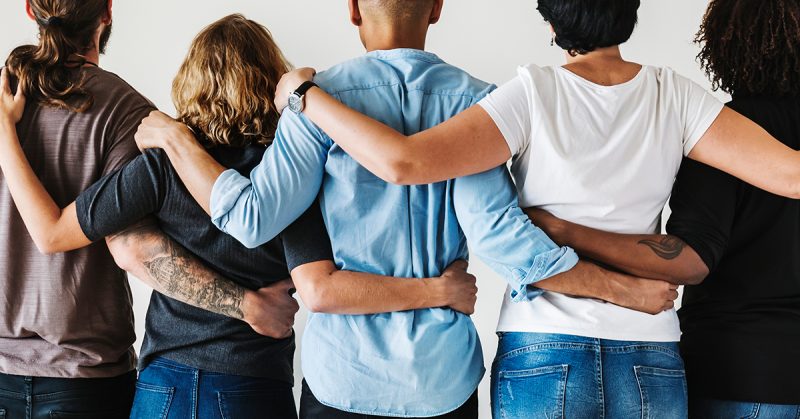The Blog Brigade stands with the Defense Department and the military community to respect, support and defend victims of domestic abuse. Preventing domestic abuse is a shared community responsibility. Read our post below for information on how you can help.
One in four women and one in nine men in the United States report being directly impacted by their experiences with relationship abuse. It seems that nearly everyone has a story about a time at a restaurant, the grocery store or even a school drop-off when they heard or saw something that just seemed off.
Maybe you heard someone speak to their significant other with hostility or disrespect, perhaps body language made you take a second look, or maybe there was even a glimpse of physical abuse.
Navigating relationship safety has become more difficult since the onset of the pandemic. Someone experiencing abuse within the walls of their own home likely doesn’t find comfort from the phrases “safe at home” or “We’re all in this together.”
Tune in
We all have off days. We argue. And we’ve shouldered extra stress, especially over the past two years as many of us have spent more time at home. These factors present a scary scenario for someone at risk for, or already enduring, domestic abuse.
In the military community, we all have a duty to recognize the difference between couples who can’t seem to communicate and often disagree, and relationships in which one partner seems to always have the upper hand, belittles the other or acts with aggression.
Tuning in to the signs of domestic abuse is arguably more important than ever before. Maybe you begin seeing vague social media posts that make you worry about a friend or neighbor. Perhaps a friend opens up to you. Or, as living on an installation often allows, maybe you hear and see signs of abuse next door.
Consider the following warning signs from the National Domestic Violence Hotline:
- Their partner puts them down in front of other people.
- They are constantly worried about making their partner angry.
- They make excuses for their partner’s behavior.
- Their partner is extremely jealous or possessive.
- They have unexplained marks or injuries.
- They’ve stopped connecting with friends and family.
- They’re depressed or anxious.
If you know the person well, you may be able to pick up on personality changes, even with added distance between you.
How can I be an upstander without making the situation worse or risking my own safety?
If you have reason to fear for your or someone else’s immediate safety, call 911.
If you know the victim — if it’s a friend, a neighbor or a colleague — it’s OK to ask the obvious question: “Do you feel safe at home?”
It’s OK to be concerned, and you can show your support by doing the following:
- Talk with them about the Family Advocacy Program. Do your best to remove the stigma and assure them that FAP can be a resource for their safety and the safety of any children in the home.
- Tell your friend to keep records of harmful or threatening actions, including texts, emails and social media posts. This can be useful in identifying patterns of behavior to create a safety plan, or down the line as evidence for law enforcement, if the abuse is severe and an unrestricted report is made.
- Encourage them to practice safe internet browsing when searching for resources and support, especially with more people working remotely for work and school.
For situations that are concerning but not emergencies, you can share available resources and support. If someone you care about is experiencing domestic abuse, it can be difficult to know what to do. Your instinct may be to try and “save” them from their relationship or convince them to leave the person who is harming them.
The key thing to remember is that your job as an upstander is to support the victim’s choices — not to make decisions based on what you would do if you were in their situation.
Domestic abuse is about power and control, so one of the best ways you can help a person in an abusive relationship is to consider how you might help empower them to choose for themselves what is best for their safety and healing.
Your best bet for help is the nearest Family Advocacy Program. Save the number of the nearest FAP in your phone for quick reference. Victims (or others concerned for a victim’s safety) can call the National Domestic Violence Hotline at 800-799-7233, or chat with someone online.
The hotline can refer you or the victim to resources — including legal assistance and emergency and transitional housing options — wherever the victim is.
If you’re ever in doubt, think to yourself: “If I was in their shoes, what kind of support would I want someone to give to me?” Assure your friend, or anyone you know who may be experiencing domestic abuse, that they are not alone and that the military community has their back.
You can call Military OneSource at any time at 800-342-9647 to get advice on how to connect with your nearest FAP and locate a Domestic Abuse Victim Advocate, or speak with a non-medical counselor.
They can help you navigate what can be a stressful but critical time for you as a friend, family member or other loved one of somebody who is in an abusive situation.






I always thought the military would take care of my daughter and grandchildren but after the experience they went through last year I know that is not true. I no longer have faith in the military. They protected the abuser. Offered no counseling or support to my daughter. A year into the divorce process and my daughter and grandchildren are still being subjected to my son in law controlling narcissistic ways. It’s been a long year for them all but hopefully it will be in court soon and some of it will be behind them.
The last straw? My son in law held a loaded gun to his head while on leave (army reserve) in front of my daughter and grandkids and said they didn’t know how many times he thought about doing that and how many times he thought about doing it and taking them with him.
Hi Marjorie. Thank you for contacting us. We are concerned for your family’s safety. Support is available from the Family Advocacy Program located at the installation nearest to you. The National Domestic Violence Hotline has trained advocates who are available 24/7 to talk confidentially. Call the hotline at 800-799-SAFE (7233). If it’s not safe for you to call or if you don’t feel comfortable doing so, another option for getting direct help is to use their live chat service.
I am, desperately, seeking guidance and assistance regarding an airman who abandoned his spouse since last year. This airman works at the “45 Civil Engineer Squadron” at Patrick Space Force Base.
Not only did he abandon his wife at the hospital, he went MIA from December 2022 until this month, July 2023. Multiple people have been notified about the abandonment, including possible robbery, and forgery or fraud, however, nothing’s been done. This airman, sat down and lied to his superiors on various occasions about the divorce, including other things.
To add, said airman is possibly committing adultery and possible co fraternization. He is still legally married but already living with another woman, who also works in the same squadron. The commander, as well as the first sergeant, have been notified but still nothing…
I am writing this because these are the people representing the USA Air Force or Space Force, and it is truly a disappointment, especially having family who’s served in the military before. Some of these actions are illegal in the military, however, no consequences are seen. Sadly, they’re making a mockery of the USA Air Force and Space Force.
When it comes to this matter, there is more than proofs and evidence, which we’re able to provide AGAIN if needed, including names and ranks. We will continue to fight because what happened is, not only cruel, but at this point illegal.
• Knowing the airman, he will probably blame the wife for making this known, but not for his behavior…
These are some of the possible articles or codes that have been infringed by this Airman:
– Article 92 – Failure to obey order or regulations – as per policy of the Air Force, he is supposed to be paying alimony to his wife, something that he didn’t do.
– Article 107 – False Statements in his first intent to file divorce. He hid information and made an email for wife, so that appeared that she was receiving the paperwork of this first intent to divorce.
– Article 121 – Larceny and wrongful appropriation when he took everything that was under his name and left wife abandoned by herself.
– Article 122 – Robbery (money stolen from joint bank account)
– Article 123 – Forgery because he lied and committed fraud and screaming her to sing documents that she saw for first time
– Article 131 – Perjury, lying to his chain of command about what is happening and changing the information to his convenience
– Article 133 – Conduct unbecoming of an officer – indecency, cruelty, dishonesty committed against spouse
– Article 134 – General Article or Adultery and fraternization with another NCO, while still legally married. That is called adultery.
Hi Alexandra, thank you for reaching out! Our hotline is available 24/7 at 800-342-9647 where you can receive non-medical counseling.